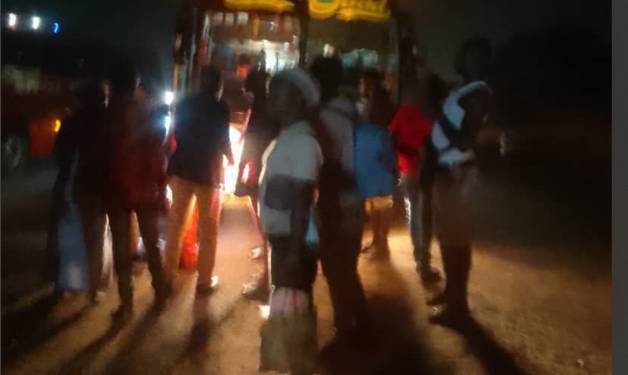In a chilling turn of events, gunmen ambushed a passenger bus in Pusi-Namoo, a suburb of Bolgatanga in the Upper East Region of Ghana, leaving scores of passengers injured. The attack, which occurred on Saturday evening around 8:00 PM, has sent shockwaves across the region and reignited concerns about the escalating violence linked to the Bawku conflict.
The bus, traveling from Garu in the Upper East Region to Kumasi in the Ashanti Region, came under heavy gunfire as armed assailants attacked it without warning. The unexpected assault left passengers scrambling for cover as bullets riddled the vehicle, causing serious injuries to many onboard.
Injured Rushed to Hospital
Emergency services swiftly responded to the scene, and the injured were transported to the Upper East Regional Hospital in Bolgatanga. Medical staff at the facility reported that several victims sustained severe gunshot wounds, with some requiring urgent surgical intervention.
“The victims arrived in a critical state. We are doing everything we can to stabilize them and ensure their recovery,†said a spokesperson for the hospital.
While the exact number of injured passengers remains unclear, eyewitness accounts suggest that the attack was brutal and indiscriminate, leaving no one on the bus unscathed.
Possible Link to the Bawku Conflict
Though the motive for the attack is yet to be officially determined, initial investigations indicate a possible connection to the ongoing Bawku conflict. The decades-long chieftaincy dispute in the region has been a source of periodic violence, with communities frequently finding themselves caught in the crossfire.
The recent resurgence of hostilities has led to widespread insecurity in the area. Despite the government’s imposition of a dawn-to-dusk curfew and increased security presence, tensions remain high, and sporadic clashes continue to disrupt the lives of residents.
Related Incident Claims Lives
Just a day before the bus attack, a violent clash erupted in the Kpalore-Gozesi area of Bawku, resulting in the deaths of two individuals. The confrontation between rival factions led to a swift response from security forces, who arrested four people and seized eight assault rifles at the scene.
These arrests bring the total death toll in the Bawku conflict to 41 since hostilities flared up again in October 2024. The government’s efforts to mediate and restore peace have so far yielded limited success, with communities resorting to self-imposed isolation to avoid being caught in the violence.
Police Investigate Bus Ambush
The Ghana Police Service has taken control of the crime scene in Pusi-Namoo and launched an investigation into the ambush. Law enforcement authorities have vowed to bring the perpetrators to justice and ensure the safety of travelers in the region.
“We are actively pursuing leads to identify and apprehend the culprits behind this heinous attack. Our priority is to restore calm and protect the lives of innocent citizens,†said a police spokesperson.
The attack has also prompted security agencies to heighten surveillance and increase patrols along major highways in the Upper East Region.
Public Reacts with Outrage
News of the ambush has drawn widespread condemnation from Ghanaians, with many taking to social media to express their anger and frustration over the deteriorating security situation.
“This is heartbreaking. Innocent people are being targeted because of a conflict they have no part in. The government must act decisively to end this madness,†one Twitter user wrote.
Others called for immediate intervention to address the root causes of the Bawku conflict, emphasizing the need for long-term solutions to prevent further loss of life.
A Call for Peace
Community leaders and civil society organizations in the Upper East Region have renewed their calls for dialogue and reconciliation among the warring factions in Bawku. They argue that without addressing the underlying issues fueling the conflict, the cycle of violence is likely to persist.
“We need to come together as a people and find a lasting resolution to this dispute. The violence is destroying lives and livelihoods, and it must stop,†said a representative of a local peacebuilding organization.
Government Response
The government has yet to issue an official statement regarding the bus attack, but sources indicate that high-level discussions are underway to assess the security situation in the region.
President John Dramani Mahama’s administration, which recently established the Operation Recover All Loot (ORAL) Committee to tackle corruption and recover state assets, is also under pressure to prioritize security and stability in volatile regions like Bawku.
The Road Ahead
As the Upper East Region grapples with the aftermath of the bus attack, there is a growing sense of urgency to address the root causes of the violence and restore peace. For the victims and their families, the road to recovery will be long and fraught with challenges.
Meanwhile, the government and security agencies face the daunting task of ensuring justice for the victims, preventing further attacks, and rebuilding trust among communities torn apart by conflict.
The Bolgatanga bus ambush serves as a grim reminder of the human cost of unresolved disputes and the urgent need for collective action to foster peace and security in Ghana’s troubled regions.




No comments yet
Be the first to share your thoughts!